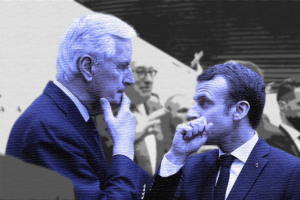Has Emmanuel Macron Lost the People for Good?
The French president plans to address the public about the yellow vest protests on Monday. It may be too little too late. French President Emmanuel Macron. (Présidence de la République du Bénin / Flickr)
French President Emmanuel Macron. (Présidence de la République du Bénin / Flickr)
PARIS — French President Emmanuel Macron will be speaking to his nation at last Monday, after increasingly violent, radicalized protests against his leadership have shaken the country and scarred its beloved capital. His long silence has aggravated that anger and many protesters are hoping only to hear one thing from Macron: “I quit.”
That’s a highly unlikely prospect.
Instead Macron is expected to announce measures to reduce taxes and boost purchasing power for France’s working classes who feel his presidency has favored the rich. He’s being forced to act after four weeks of “yellow vest” protests that started in France’s struggling provinces and morphed into surging riots in Paris, scaring tourists and foreign investors alike.
The 40-year-old leader met Monday in his presidential palace with local and national politicians, unions and business leaders to hear their concerns — but with no representatives of the scattered, leaderless protest movement.
On Monday evening, Macron will give a national televised address, his first public words in more than a week. Some fed-up demonstrators have already promised new demonstrations this Saturday, regardless of what the president says.
Participants at Monday’s meeting said the president didn’t leak his plans but seemed to grasp the gravity of the yellow vest crisis.
“We will listen to him to see if we have been heard,” said Yves Veyrier, secretary general of the leftist workers union FO.
Small business representatives lamented the blow to retail and other companies at the height of the Christmas shopping season.
Herve Morin, a centrist politician who heads a group of regional leaders, said Macron gave no signs of stepping down. Morin urged the president to change “the method and the software” in communicating with the French public, warning that if he doesn’t, “the country risks heading into chaos.”
A presidential official said 37 people were around a table with the president on Monday, describing how the yellow vest protest movement is impacting their industries, unions, small businesses and local governments.
Among steps the French government is considering are new taxes on online giants like Google and Amazon; abolishing taxes on workers’ overtime and speeding up tax cuts.
Finance Minister Bruno Le Maire said Monday the government could delay some payroll taxes but expressed resistance to restoring the wealth tax or lowering taxes for retirees, among the protesters’ many and varied demands. He stressed that the new measures should focus on helping the working classes.
“We are ready to make any gesture” that works, he said on RTL radio. “What is important now is to put an end to the crisis and find peace and unity in the country again.”
Fallout from the protests so far could cost France 0.1 percent of gross domestic product in the last quarter of the year, Le Maire warned.
“That means fewer jobs, it means less prosperity for the whole country,” he said.
The yellow vest protests began in November against a rise in fuel taxes — which Macron eventually abandoned last week — but have mushroomed to include a plethora of sometimes contradictory demands, including, lately, Macron’s resignation.
“Macron is there for the rich, not for all the French,” 68-year-old retiree Jean-Pierre Meunuer said at Saturday’s protest in Paris.
With new demonstrations planned Saturday, some police officers exhausted by four weekends of rioting are calling for overtime to be paid.
“The state should commit itself to the payment of overtime,” the UNSA police union said in a statement Monday. “These extra hours should be exempted from tax. Night hours should be revalued.”
Graffiti throughout the French capital singles Macron out for criticism, reflecting a national sense that the centrist former banker is arrogant and out of touch. Macron however has appeared determined to continue trying to make the French economy more competitive globally. No French presidential or parliamentary elections are planned until 2022.
Key Paris tourist sites reopened Sunday, including such as the Louvre museum and the Eiffel Tower, while workers cleaned up tons of debris from Saturday’s protests, which left widespread damage in the capital and elsewhere.
At least 71 people were injured in the Paris protest riots on Saturday and nearly 1,000 people were being held in custody.
French media reported that 136,000 protesters took to the streets nationwide Saturday.
Your support matters…Independent journalism is under threat and overshadowed by heavily funded mainstream media.
You can help level the playing field. Become a member.
Your tax-deductible contribution keeps us digging beneath the headlines to give you thought-provoking, investigative reporting and analysis that unearths what's really happening- without compromise.
Give today to support our courageous, independent journalists.








You need to be a supporter to comment.
There are currently no responses to this article.
Be the first to respond.